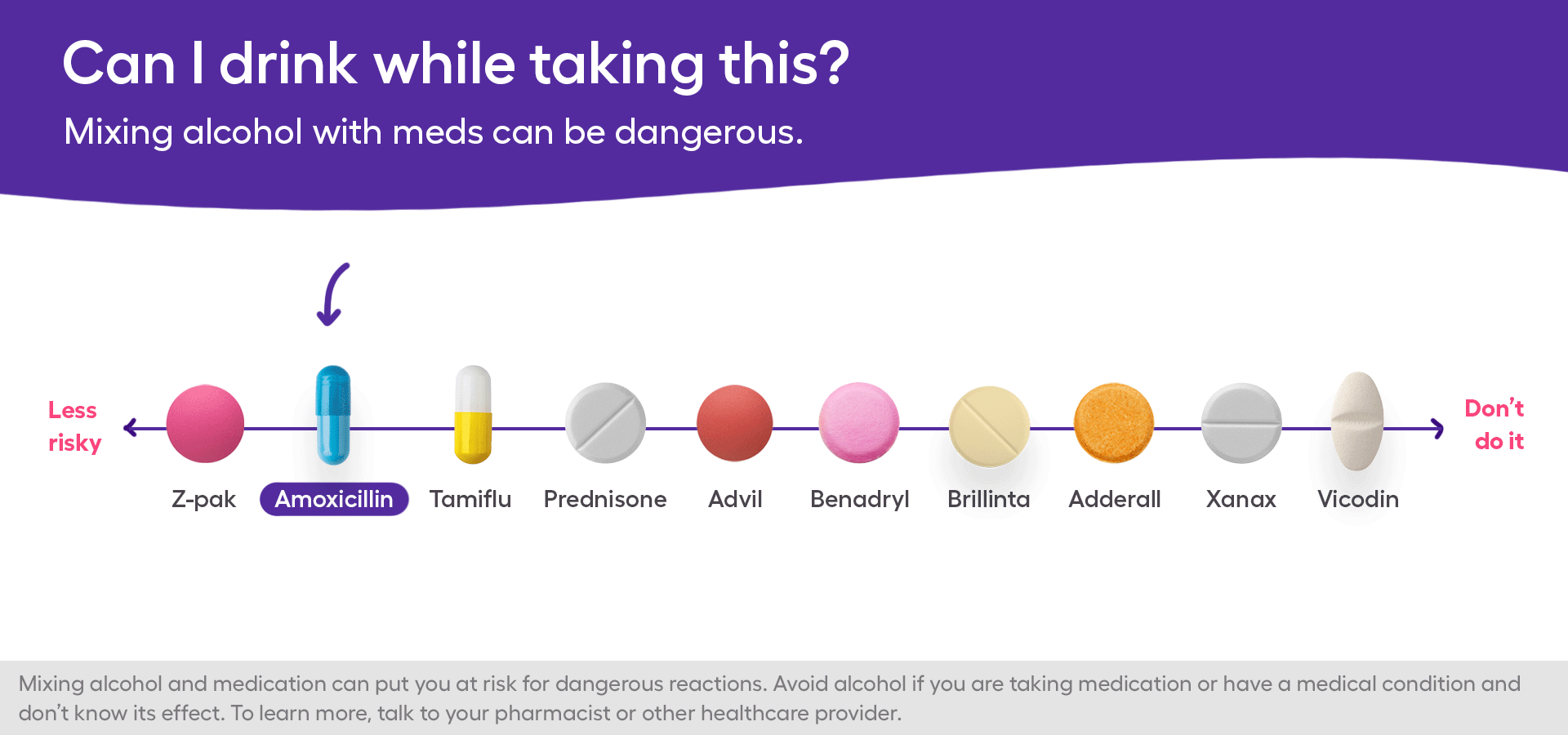If you come down with a bacterial infection, you may be prescribed an antibiotic like amoxicillin. Treatment with amoxicillin typically lasts for several days, so you might be wondering whether combining amoxicillin and alcohol is safe, especially if the treatment course falls on a weekend or special occasion when you might be offered a cocktail or a glass of wine. Fortunately, amoxicillin is less likely than other medications to have a severe interaction with alcohol. For the most part, combining alcohol and amoxicillin should not cause any problems as long as you drink in moderation.
However, the low risk of problems while combining alcohol and amoxicillin is not absolute. The side effects of amoxicillin and alcohol can overlap, leading to worsened side effects of either substance. In addition, alcohol may affect how the body and immune system fights an infection. Continue reading to learn more about what happens when you mix amoxicillin and alcohol.
What is amoxicillin?
Amoxicillin, also known by the brand name Amoxil, is part of one of the oldest groups of antibiotics, penicillins. It is a semi-synthetic antibiotic that was introduced in 1972. It is FDA-approved for bacterial infections of the ear, nose, throat, and lower respiratory tract; urinary tract infections; and skin infections. It is available in different forms, including regular tablets, chewable tablets, and oral suspensions.
Amoxicillin is usually prescribed to be taken two to three times daily for three to seven days, although it can be prescribed for up to two weeks. The duration of treatment will depend on the infection being treated. Amoxicillin is not effective against viral or fungal infections.
Amoxicillin side effects
Amoxicillin may cause mild to severe side effects. In most cases, the side effects of amoxicillin are mild and temporary. The most common side effects of amoxicillin include gastrointestinal side effects, such as diarrhea, nausea, and vomiting.
Serious side effects of amoxicillin include Clostridium difficile-associated diarrhea, which can also cause severe abdominal pain or cramping. Kidney and liver problems have also been reported with the use of amoxicillin. Allergic reactions with symptoms such as hives, swelling of the face, and trouble breathing are also possible while using amoxicillin.
Other side effects of amoxicillin may include a black hairy tongue, inflammation of the colon (colitis), insomnia, agitation, and changes in blood counts.
Can you mix amoxicillin and alcohol?
You likely won’t have to avoid drinking alcohol completely while taking amoxicillin. Drinking a glass of red wine with dinner shouldn’t be a problem. However, if you’re planning on drinking several glasses, you might be in trouble. For example, if you binge drink for a night, you might experience nausea and vomiting, which are common side effects of amoxicillin.
As long as you stick to low to moderate alcohol consumption, you don’t have to worry about serious side effects. This means limiting alcohol intake to two drinks or less per day for men and one drink or less per day for women.
Healthcare professionals will generally recommend you avoid alcohol while you’re sick. Drinking alcohol may affect your body’s ability to fight an infection. Therefore, abstaining from alcohol could help your body get much-needed rest to fight an infection.
In some cases, you may be prescribed a combination of amoxicillin and another drug called clavulanate. This combination antibiotic, also known by the brand name Augmentin, is not known to interact with alcohol. 
Amoxicillin and alcohol interaction
There is no mention of an amoxicillin and alcohol interaction in the FDA drug label for amoxicillin. Mixing amoxicillin and alcohol is not known to cause a severe reaction. In addition, alcohol will not affect how well amoxicillin works.
Antibiotics interactions with alcohol
Other antibiotics are more likely than amoxicillin to interact with alcohol. For example, mixing Flagyl (metronidazole) with alcohol can lead to a disulfiram-like reaction that can cause flushing, nausea, headache, rapid heart rate, and increased blood pressure. Tindamax (tinidazole), Bactrim (sulfamethoxazole/trimethoprim), and Keflex (cephalexin) are other antibiotics that can lead to a disulfiram-like reaction when mixed with alcohol.
Some antibiotics can cause other problems when mixed with alcohol. For example, mixing an antibiotic called Nydrazid (isoniazid) with alcohol may increase the risk of liver damage. Drinking large amounts of alcohol can reduce the effectiveness of some antibiotics, such as Vibramycin (doxycycline).
Problems with drinking alcohol with an infection
Although alcohol does not directly interact with amoxicillin, alcohol can have other effects on the body that can be detrimental during an infection. Alcohol use, especially long-term consumption, can cause a weakened immune system. People who have been diagnosed with alcohol use disorder or alcohol addiction may have a harder time fighting infections.
Alcohol is considered a diuretic, which can cause the body to get rid of fluids quickly. As a result, alcohol can cause dehydration. Drinking lots of fluids and staying hydrated are essential parts of self-care when dealing with an illness or infection. For this reason, you may want to avoid alcohol while being treated for an infection.
How to take amoxicillin safely
Amoxicillin, like other antibiotics, can only do its job if it’s being taken correctly and safely. There are some ways to ensure you’re getting the most out of your treatment and avoid potential side effects.
- Take amoxicillin as prescribed. Taking a higher dose than normal may increase the risk of side effects. If you need help remembering to take scheduled doses, set an alarm or reminder. While amoxicillin can be taken with or without food, some people experience fewer gastrointestinal side effects when taking it with a meal.
- Tell your doctor about any medical conditions you have or medications you’re taking. Make sure to tell your provider about any medical conditions you have, such as kidney or liver problems. You should also tell them about other medications you’re taking, including prescription drugs, over-the-counter medicine, and herbal supplements.
- Don’t stop taking amoxicillin without talking to a healthcare provider. Abruptly stopping amoxicillin could lead to antibiotic resistance, which may require a different antibiotic and a longer treatment duration.
- Tell your healthcare provider about any side effects that concern you. If you experience unusual stomach pain or other side effects after taking amoxicillin, especially after drinking alcohol, talk to your healthcare provider.
When to consult a healthcare provider
It’s important to seek medical advice from a healthcare provider before starting treatment with amoxicillin. A healthcare provider can help guide you on the best way to take your medication to avoid potential side effects and drug interactions.
Seek immediate medical attention if you experience signs or symptoms of an allergic reaction while taking amoxicillin. You should consult a healthcare provider if you experience severe diarrhea that is painful, bloody, or does not seem to go away or get better. You should also consult a healthcare provider if you drink alcohol with amoxicillin and experience severe nausea and vomiting. You may be recommended other treatment options if amoxicillin isn’t right for you.
Bottom line
If you’re asking yourself if you can take amoxicillin and drink alcohol, we commend you on being cautious about your health and well-being. The good news is you’re not likely to experience a severe reaction from mixing alcohol and amoxicillin. Alcohol shouldn’t affect how amoxicillin works to fight a bacterial infection.
However, you’ll want to limit the amount of alcohol you drink during treatment. It’s best to stick with consuming alcohol in moderation or avoid alcohol altogether. Drinking alcohol may increase certain side effects of amoxicillin, such as nausea and vomiting. Increased alcohol use can also affect the body’s ability to fight an infection and recover.











